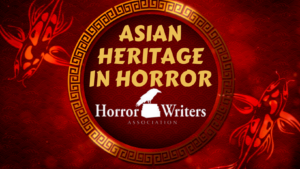Asian Heritage in Horror: Introduction by K.P. Kulski

 K.P. KULSKI is a Hawaii-born Korean-American author, historian, and career vampire of patriarchal tears. Channeling a lifelong obsession with history and the morose, she’s managed to birth the gothic horror novel Fairest Flesh and novella House of Pungsu. She bartered nine years of her life to the U.S. Navy and Air Force for food and later taught college history to a captive audience. Trapped by a force field, she currently resides in the woods of Northeast Ohio where she (probably) brews potions and talks to ghosts. Follow her on Instagram and Twitter: @garnetonwinter or visit garnetonwinter.com.
K.P. KULSKI is a Hawaii-born Korean-American author, historian, and career vampire of patriarchal tears. Channeling a lifelong obsession with history and the morose, she’s managed to birth the gothic horror novel Fairest Flesh and novella House of Pungsu. She bartered nine years of her life to the U.S. Navy and Air Force for food and later taught college history to a captive audience. Trapped by a force field, she currently resides in the woods of Northeast Ohio where she (probably) brews potions and talks to ghosts. Follow her on Instagram and Twitter: @garnetonwinter or visit garnetonwinter.com.
API/ANHPI Heritage Month Introduction By K.P. Kulski
API (Asian Pacific Islander)/ANHPI (Asian Native Hawaiian Pacific Islander) are acronyms that house a huge umbrella of identities. We’re an immensely diverse group and to give a sense of scale, these acronyms represent cultures that span across both the largest continent and largest ocean on Earth. Our cultures are ancient, reaching back to the dawn of human civilization. A history that includes many empires and architectural, artistic, and technological feats. It seems boggling that we’d seem so invisible. Yet here we are.
I admit, after being asked to pen this introduction, I sat a long while staring at a blinking cursor before finally writing some words and then deleting them all. The problem is there’s simply so much to say, so much to shed light on, it’s hard to decide where the heck to start.
I mean… I could talk about the history of API/ANHPI contributions to history and the world or the long history of our contributions to places like the United States. I could discuss the complexity of the API/ANHPI acronyms and the identities they cover (Eeep!). Or feelings of invisibility, anti-Asian hate, and rising violence. Or detail the horrors of colonialism and imperialism and its impact on ANHPI peoples and further, how we’ve persevered through and despite it all. I could make this introduction pleasant or show up with charts and a PowerPoint filled with uncomfortable information. I could be angry or sad or proud.
It’s because all these things swirl inside me the moment I think about this topic with any depth. A faint sort of ache happens, and I must choose one thread to even begin to unravel all the emotions and every single one of those threads leads to another and then another. It makes me think of how elements in East Asian mysticism exist on a continuum instead of divided into clear categories: water creating conditions for the growth of trees, wood giving over to the fire, then ashes into the earth, and how from the earth we pull metals. How it all exists together in a simultaneous reality. You see, I’m very proud of being a Korean woman. But as an American, my Asian-ness has been the ignition point for much pain as well. Both parts of these experiences exist simultaneously.
I see API/ANHPI heritage month (and all the months dedicated to historically marginalized heritages) kind of how I see Valentine’s Day. It’s a lovely holiday, and it’s good we have it, but shouldn’t we be expressing our love all year round? We don’t give our loved ones chocolates and flowers once a year and really think that’s quite enough affection and connection, thank you. Instead, it should be a starting point and a reminder. All these things are worth talking about, worth celebrating, worth the tears, worth putting in the work, and achieving subsequent growth. As individuals and as a society.
Through all this, I think the best thing I can tell you is what the concept of API/ANHPI Heritage Month means to me. I think you will find for many of us in the API/ANHPI community, the meaning varies a good deal, but some of what I express may be found in common as well.
To me, it means family, hope, and sorrow. It means my mother’s brilliance, creativity, and sacrifice were all important. How my children’s connection to their Korean heritage should be one based on both pride and an understanding of history and further that history has a place in the world (and in American culture). It means we should celebrate and accept the countless expressions and realities of API/ANHPI identity. It means being honest with ourselves about things we need to improve and reaching out to mend divisions. It means being seen, from the heights of our triumphs, and successes, to the lows of our pain and struggle.
When the Atlanta Spa Shootings happened, I knew immediately what most Asian-American women knew: it was an act of racism. I clammed up, tried to be strong, because after all, many marginalized people in our nation have experienced the same, who was I to complain? Then one kind friend sent a message to check on me.
Subsequently, I was able to admit I most certainly was not okay. My friend in a single moment became an ally, someone who recognized the wrongness and acted on the knowledge. If the fairy godmother of marginalized heritage months grants me one thing in this API/ANHPI cycle, I wish for active allies. For people with good intentions in their hearts to see API/ANHPI people and stand up with us. To talk about and speak out against anti-Asian sentiments.
If you don’t know where to start, or hell, even if you do know where to start, pick up our books, read what we have to say. See how we love and fight. There’s a renaissance of horror publications coming from fabulously talented Asian writers in the horror community right this moment. You’re about to get a chance to read interviews with many of us this month on the HWA website— tons of authors bringing a wealth of storytelling.
Truthfully, we’ve been here all along, from fighting in the Civil War, building railroads to building fantastic (and frightening) fictional worlds. Maybe you’re just noticing, maybe you’re curious and want to know more.
Hopefully, this month will be a starting point, or a reminder, and you’ll take some time and see us. Then the rest of the year I hope you remember and keep coming back for a visit. After all, we have many wonderful, and wonderfully terrifying things to show you.
Some resources and info for Allies:
“Confronting the invisibility of anti-Asian racism” by Jennifer Lee: https://www.brookings.edu/blog/how-we-rise/2022/05/18/confronting-the-invisibility-of-anti-asian-racism/
“APA, AAPI, APIDA or AANHPI? The History and significance of the ‘Asian American’ identity crisis” by Arielle Tiangco: https://www.optimistdaily.com/2022/04/apa-aapi-apida-aanhpi-the-history-and-significance-of-the-asian-american-identity-crisis/



